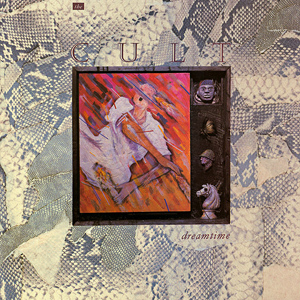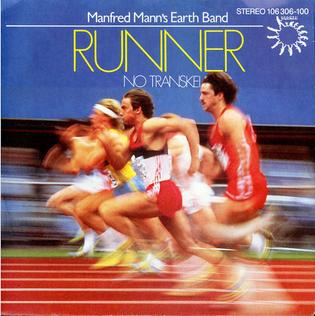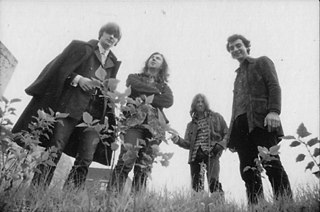Related Research Articles
Gothic rock is a style of rock music that emerged from post-punk in the United Kingdom in the late 1970s. The first post-punk bands which shifted toward dark music with gothic overtones include Siouxsie and the Banshees, Joy Division, Bauhaus, and the Cure.

Dreamtime is the debut studio album by the English rock band the Cult. Released on 31 August 1984 by Beggars Banquet Records, it peaked at No. 21 on the UK Albums Chart and was later certified silver by the BPI after having sold 60,000 copies. The first single, "Spiritwalker", peaked at No. 1 on the UK Independent Singles Chart. Dreamtime has subsequently been reissued in roughly 30 countries worldwide.
The Batcave was a weekly club-night launched at 69 Dean Street in central London in 1982. It is considered to be the birthplace of the Southern English goth subculture. It lent its name to the term Batcaver, used to describe fans of the original gothic rock music, who would adorn themselves in Batwing coffin necklaces to distinguish themselves from other goth clubs.

Portion Control are a British electronic and industrial band from South London, formed in 1979. The original incarnation of the group existed until 1987; after a brief incarnation as Solar Enemy, they reformed in 2002.

The Thieving Magpie (La Gazza Ladra) is a double live album by the British neo-prog band Marillion. It was named after the introductory piece of classical music the band used before coming on stage during the Clutching at Straws tour 1987–1988, the overture to Rossini's opera La gazza ladra, which translates as "The Thieving Magpie". The album was released shortly after singer Fish's departure from the band (and before Steve Hogarth's arrival) and was intended to document the "Fish years". It complements the band's first live album Real to Reel insofar as there are no overlaps. The Thieving Magpie is not a continuous live recording, but a compilation of tracks recorded at different times and places, with audible gaps between them and different moods on the individual tracks. However, the double vinyl version does include the first side of the UK number one concept album Misplaced Childhood (1985). The CD and cassette version includes the full album, as well as the track "Freaks" – originally the b-side to "Lavender", it was used as the lead single for The Thieving Magpie peaking at no. 18 in the UK.

Mick Turner is an Australian musician and artist. He is the founding mainstay guitarist for Dirty Three and has had art exhibitions around Australia and internationally. Previously he was a member of the Sick Things, the Moodists (1983–84) and Venom P. Stinger. He has released four solo studio albums, Tren Phantasma (1997), Marlan Rosa (1999), Moth (2003) and Don't tell the Driver (2013).
Peter Jefferies is a musician from New Zealand. He is known for his involvement with Nocturnal Projections and This Kind of Punishment as well as his extensive solo and collaborative work.
Cold wave is a loosely defined music genre that emerged in Europe the late 1970s, characterized by its detached lyrical tone, use of early electronic music instruments and a minimalist approach and style. It emerged from post-punk bands who, influenced by German electronic group Kraftwerk, made use of affordable portable synthesizers such as the Korg MS-20.
The Wake is an American gothic rock band from Columbus, Ohio, United States.

Cauda Pavonis are an English deathrock band founded in 1998, by Su Farr and Dave Wainwright. Originally conceived as a 'dark romantic' experience, Cauda Pavonis broke onto the UK goth circuit supporting acts such as Star Industry and Inkubus Sukkubus. At the outset Cauda Pavonis were noted for their consciously-minimalist synthesized melodies and their use of live drums. They were described by Mick Mercer in his book 21st Century Goth as a "Dark duo from UK with a bright future" and by Starvox as "The most old school sounding goth since Rozz Williams hung himself". Since then the line-up has grown and the band have appeared twice at the Whitby Gothic Weekend and the Wave-Gotik-Treffen. In 2003 and again in 2007, Cauda Pavonis were the focus of the ITV television programme, Magick Eve.

Mick Hale is an American musician, songwriter, producer, remixer, DJ, and graphic artist. Credited on over three dozen commercial releases, his body of work spans over 30 years, from 1984 onwards.

Inca Babies are an English post-punk band from Manchester, initially active between 1982 and 1988, reforming in 2007 featuring founder member and original songwriter Harry Stafford. With a new line-up of Rob Haynes (drums) and Vince Hunt (bass) the Inca Babies have released four new albums and continue to tour extensively in the UK and Europe.

"Radio Wall of Sound" is a song by English rock band Slade, released in October 1991 as the first single from their compilation album Wall of Hits. Written and produced by bassist Jim Lea, the song reached number 21 in the UK Singles Chart and remained in the top 100 for five weeks. It was Slade's last hit single, discounting later chartings of "Merry Xmas Everybody".
Ritual was an early 1980s Harrow-based post-punk band that were later aligned with the early UK-based gothic rock movement. The group is commonly associated with Death Cult, which two Ritual members later joined.

Burning Image are an American deathrock band formed in Bakersfield, California in 1982. Burning Image first released a 7" single with the songs "The Final Conflict" and "Burning Image, Burning" in the summer of 1984. The compilation 1983–1987 in 2004 and album Fantasma (2009) were both released on Alternative Tentacles, record label owned by former Dead Kennedys singer, Jello Biafra, with album Oleander (2011) being self-published. Burning Image celebrates 39 years as a band, in 2021, with a new album.
Die Laughing are an English goth band formed in 1986 by John Berry.
Brad Laner is an American musician and record producer best known for his work with the shoegaze band Medicine, which he founded and led.
Chakk were an industrial funk band from Sheffield, who existed from 1981 until 1987. Members were Alan Cross, Mark Brydon, Dee Boyle, Sim Lister, Jake Harries and Jon Stuart. The band never achieved commercial success, but have been noted for their wide influence on later British dance music, particularly via Fon Studios. Mark Brydon later went on to form and achieved success with Moloko.

"The Runner", also called simply "Runner", is a song written by Canadian rock musician Ian Thomas and released in 1981 on his album of the same name. Inspired by the story of Terry Fox, "The Runner" was covered by French singer Sheila later that year, but its most famous rendition was recorded by Manfred Mann's Earth Band, a British band known for making hits of reworked cover songs, and released as a single in 1984, shortly before that year's Summer Olympics. The timing of the Manfred Mann's Earth Band version made it a success, and it reached number 22 on the Billboard Hot 100 in the United States.

The Moffs were a psychedelic rock band formed in Sydney in 1984. They are perhaps best known for their 1985 song Another Day in the Sun, that attracted local and international underground attention. Led by Tom Kazas, they incorporated many styles during their five-year career: psychedelic rock, progressive rock, blues rock, early post rock, atmospheric rock, 1960s and 1980s pop, free improvisation, impressionistic lyrics, Greek folk music styles, experimental composition and repetitive minimalist structures. The band's name was invented by misspelling the word 'moths'.
References
- ↑ drury, steve. "SDT". Party Day. sdtfoto / party day. Retrieved 5 March 2021.
- 1 2 3 4 5 6 7 "Party Day Indie Goth Music". Party-day.co.uk.
- 1 2 "Invisible Guy". repartiseraren.se. Archived from the original on 22 September 2020.
- ↑ Zigzag Magazine, singles review, July 1983
- ↑ Tibet, Sounds, 19 May 1984
- ↑ "The Perfumed Garden: John Peel - 2nd July 1984". Theperfumedgarden.blogspot.com. 16 December 2014.
- ↑ Richard Rouska, Rouska Magazine, 1984
- ↑ Darlington, Andy (19 March 2020). "Eight Miles Higher". Party Day Interview. Retrieved 16 March 2021.
- ↑ Mick Mercer, Melody Maker, album reviews, 12 July 1986
- ↑ Martin Lilleker, The Star (Sheffield), album review, 11 February 1984
- ↑ Sheffield, Polytech. "04/12/1983 gig". Sheffield Music Archive. Retrieved 2 April 2021.
- ↑ NEM. Leeds Other Paper, 27 January 1984
- ↑ Mr Spencer, Sounds, 19 May 1984
- ↑ Susan Williams (aka Seething Wells), NME, 3 March 1984
- ↑ Granuaile, ZigZag Magazine, February 1986
- ↑ Strobelight, Records. "Germany's". Strobelight Records. Strobelight. Retrieved 18 February 2021.
- ↑ "DJ Martin Oldgoth, The Last Cry 30th Anniversary, July 2015 (Brighton)" (PDF). Party-day.co.uk.
- ↑ DJ Dragnet, League Of Extraordinary Dj’s Setlist, Nov 2016 (Amsterdam)
- ↑ Benny, Blanco (23 May 2020). "DJ". Blancodisco. bennyblanco. Retrieved 18 February 2021.
- ↑ Dark Wave, Radio.net (15 December 2018). "Dark Wave Radio". darkwaveradio.net. Retrieved 2 April 2021.
- ↑ "Optic Nerve Recordings". Party Day - Sorted!. Optic Nerve Recordings. Retrieved 16 March 2021.